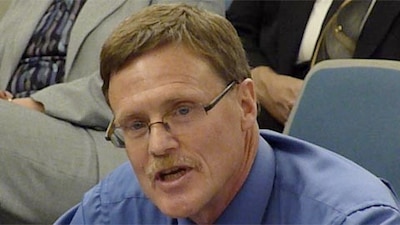The State Board of Education voted 6-1 Wednesday to grant an innovation application from the Kit Carson school district. A key feature of the plan grants the district waivers from some provisions of Senate Bill 10-191, the landmark educator evaluation and tenure law.
The vote is noteworthy because board members faced a seeming conflict between the 2008 Innovation Schools Act and last year’s educator effectiveness law.
In effect, the board decided the innovation law trumped the effectiveness statute in this case. The decision was doubly interesting because regulations for implementing the effectiveness law won’t be voted on by the board until later this year. In effect, Kit Carson was asking for exemption from rules that don’t yet exist.
Rich Wenning, associate commissioner of education, also warned the board that granting Kit Carson’s request might set a bad precedent by tempting other districts to seek similar waivers. “The department does believe that the potential negative consequences to student achievement across the state outweigh the potential benefits to Kit Carson.”
Later in the hearing, Sen. Mike Johnston, D-Denver and author of SB 10-191, in essence contradicted that, saying Kit Carson has unique circumstances that few other districts could copy. Board member Paul Lundeen, R-5th District, agreed with that analysis.

Kit Carson, about 150 miles southeast of Denver, has 109 students in all grades and 17 teachers on a single campus. Although several schools have sought and gained innovation status, Kit Carson is the first district to apply. Under the innovation law, a school receives waivers from a wide variety of state requirements, including those governing employment, but a school must meet a high standard for teacher, parent and community support for the change before it can apply.
Johnston indicated he thought it would be hard for a district with more than one school to jump those hurdles.
He was the surprise “witness” at the hearing, showing up with aide Greg Carter just as the board started its deliberations very late in the afternoon after a long day of other business.
The senator’s comments sparked a lengthy legal discussion about whether it’s possible to waive SB 10-191 provisions on annual educator evaluations and how teachers can lose non-probationary status.
“The goal was for [the law] that to be a statewide system,” Johnston said. Evaluation and tenure provisions “were never meant to be waived.” Only sections on mutual consent and forced placement were written to be waived, he said.
But Kit Carson Superintendent Gerald Keefe and district lawyer Kristin Edger said the innovation act allows broad waivers and allows the state board to reject an application for only two reasons – if innovation status would harm a district’s finances or threaten student achievement.
The waivers “are appropriate and permitted,” said Edger, who works for the Boulder firm of Caplan and Earnest, which has extensive experience representing school districts. She also argued that SBE was legally bound to just consider the impact on Kit Carson, not any possible statewide implications.
The legal riddle was confusing to some board members. Elaine Gantz Berman, D-1st District, even asked that the vote be delayed a month for more legal research and advice.
Chair Bob Schaffer, R-4th District, wasn’t persuaded, saying, “My sense is we ought to vote today. … I don’t see much ambiguity” in the innovation law.
In the end, Berman voted yes. The only no vote was cast by Angelika Schroeder, D-2nd District.
Kit Carson plans to set up its own evaluation system to make it easier to recruit and retain teachers in the tiny, remote Eastern Plains district. The proposal includes a longer probation period for new teachers, longer time spans between evaluations than in SB 10-191 and multi-year teacher contracts. The Kit Carson system does follow the mandate that 50 percent of evaluations be based on student growth. The innovation application also includes exemption from teacher licensing laws, but that provision wasn’t part of the legal dispute.
Read the application, part 1 and part 2, and see the CDE staff critique.
Keefe, a longtime advocate for the special needs of rural districts, was elated with the decision, calling it “A great day for democracy and the Innovation Schools Act.” He said he’d expected a closer board vote and was happy the board “had the courage to follow the guidelines of” the innovation law. He also said that if SB 10-191 had contained a rural schools section it probably would have looked a lot like his innovation application. (Previous story on Kit Carson.)

Johnston told Education News Colorado later, “I’m not overly concerned” by the board vote adding, “I don’t think it’s a scenario we’re every likely to see again.” He said he believes the state board is committed to the overall goals of SB 10-191.
The final irony to the whole issue is that the Innovation Schools Act was pushed by Democratic former Senate President Peter Groff, who held the District 33 seat before leaving to take a job in Washington. Johnston was appointed to fill that same seat and elected to a full term last November.
Asked about that, Johnston laughed and said, “I was going to text Peter Groff and ask him if the innovation act lets you out of SB 191.”
Charter appeals go 1-1
The board voted 6-1 to uphold the St. Vrain school board’s denial of a charter for the Lotus School for Excellence at Longmont. Lotus currently operates a school in Aurora. The St. Vrain board cited concerns about financial practices, parent and community support, and facilities in denying the application
Following an afternoon hearing, the board voted 6-1 to grant an appeal by the Youth and Family Academy, an alternative education charter in Pueblo. The Pueblo City schools wanted to close YAFA after the end of this school year. The decision sends the case back to the Pueblo board for further consideration. A large crowd of students, staff and school supporters jammed into the boardroom for the hearing and applauded politely after the vote.
Resolution urges districts to think creatively
After a fair amount of back and forth, the board voted 7-0 for a non-binding resolution calling on school districts to be innovative in the face of steep budget cuts and consider such changes as streamlined administration, competitive contracting, digital learning, enhanced education options and “performance-based compensation systems.” The resolution originally was proposed by Schaffer.
Arrest reporting rule debated
The board also burned a lot of time discussing a regulation proposed by Schaffer that would require school districts to report arrests and charging of school employees to parents. The board has been fussing over this issue for more than a year and defeated a similar rule last spring. The board will take it up again in April. Text
